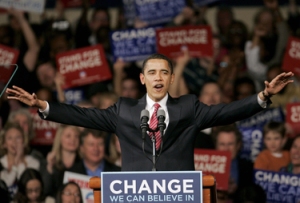Obama’s Communication Struggle in the White House
 At the 2004 Democratic National Convention, I watched as Barack Obama addressed the nation for the first time on behalf of John Kerry. He had a palpable charisma and intelligence that got people talking—this could be the first black president someday. Someday came only four years later.
At the 2004 Democratic National Convention, I watched as Barack Obama addressed the nation for the first time on behalf of John Kerry. He had a palpable charisma and intelligence that got people talking—this could be the first black president someday. Someday came only four years later.
One of the key components to President Barack Obama’s campaign success was his ability to communicate and inspire the American people. He reached out on a level that citizens had grown unaccustomed to in recent years. His energy and wit made it obvious that he was an effective communicator and had fun while doing it.
This background makes it odd that one of the main complaints of Obama’s presidency is the lack of communication and information coming from the White House. While facts tend to be shared, there appears to be a deficit of empathy, and the president has been described as ineffective and passive. What happened? Did the American people and the press fall out of love with the idol they built Obama up to be?
Tina Brown, co-founder of The Daily Beast, shared her opinion on CNN’s Sept. 19 edition of Reliable Sources. She argued Obama had nowhere to go but down. The media idolized him throughout the campaign process and created an image that would be hard for anyone to live up to.
Jim Vandehei and Mike Allen coauthored a March 19, 2009, Politico article directly addressing Obama’s response to this complaint and the manner in which “Obama himself seems to subscribe to the notion that no one is listening.”
“What I haven’t always been successful at doing is breaking through the noise and speaking directly to the American people in a way that during the campaign you could do,” Obama told ABC’s George Stephanopoulos, as cited in the article.
The White House took strides to expand its reach to the public by embracing new realms of social media such as Facebook and Twitter. White House Press Secretary Robert Gibbs even uses his own Twitter account to get an unfiltered voice out. Not one of these avenues seems to give the people what they want: a direct relationship with their president.
It is not as though this relationship existed with past presidents and Obama stripped the public of that. Contrarily, I believe the American people painted an unattainable picture of Obama during the campaign; he no longer has the capability to reach out on a daily basis. You won’t find him at your local diner shaking hands or see shots on the evening news of him playing basketball with his friends. This results in a less romanticized image, and I think people are simply disappointed that Obama is a normal human being learning one day at a time how to handle being the leader of the free world.
This does not mean, however, that Obama does not need to make himself more accessible and empathetic with the American people. This goal can be accomplished through simple changes in wording and the way he presents his statements. The president has no choice but to change his presentation and start making heart arguments rather than head arguments. By touching people’s hearts, he will slowly start making his way back into them, too.
Opinions
Comments are closed.





Post comment
I agree with the article, but I also think another facet is that it is much harder to be as transparent with the public while you are in office then when you are campaigning. While you are campaigning you can say what you want to say and need to say to be elected. I feel that he is learning as many a president has before him that the reality of a lot the issues he is facing is not as simple as a campaign speech. That’s not to say that he cannot deal with them.
PermalinkPost comment
Very intriguing post, Katie! Enjoy Platform this semester.
Permalink